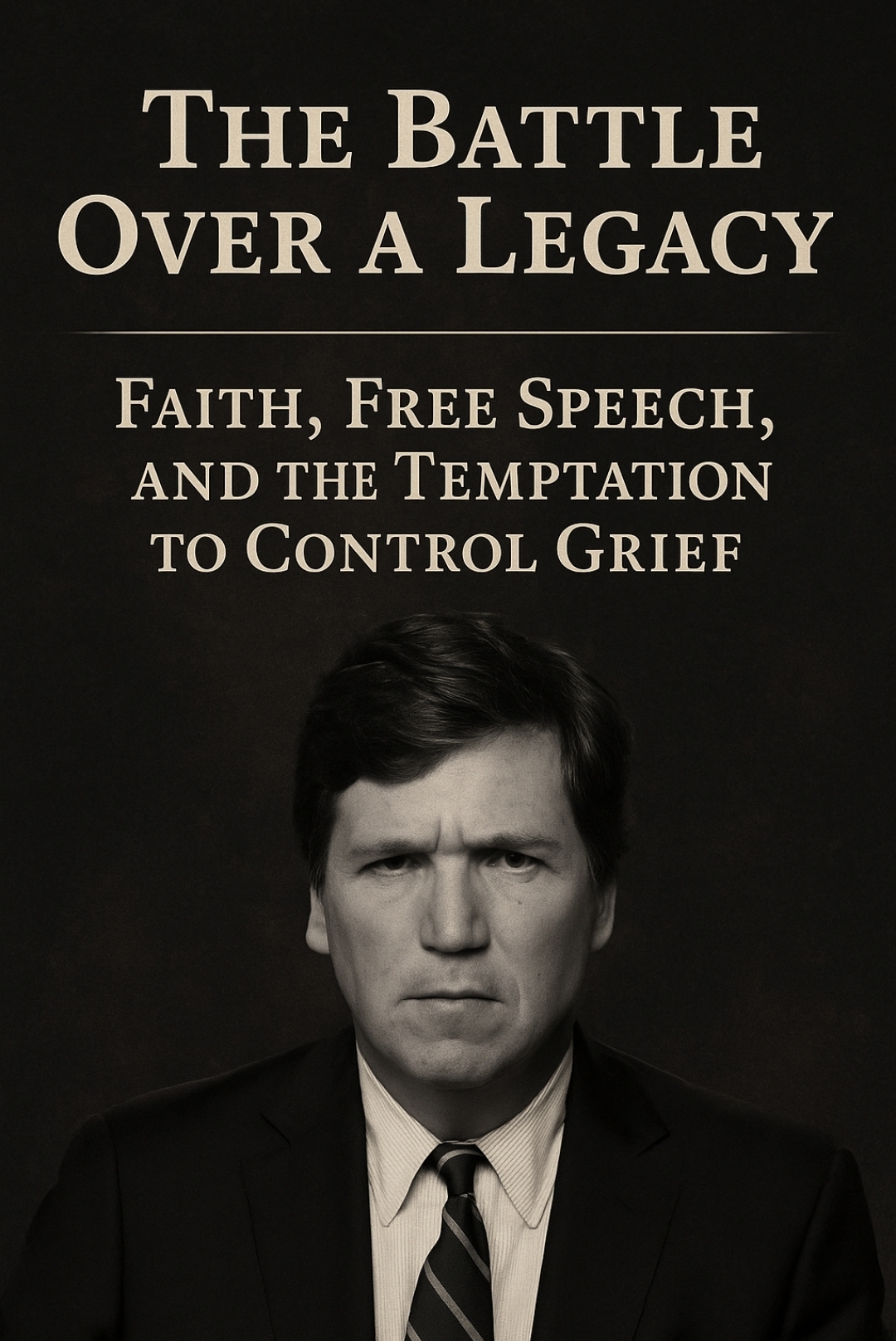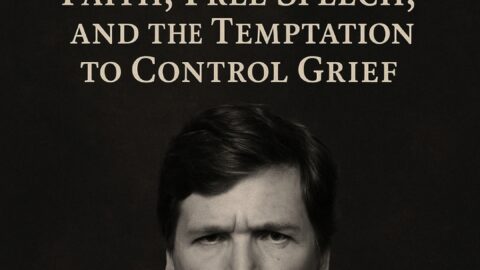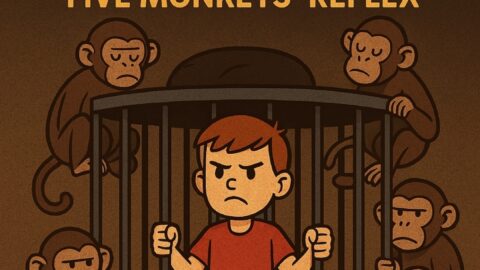When a public figure dies, the scramble to define what their life “meant” begins immediately. That struggle isn’t just about memory—it’s about power. Tucker Carlson speaks into that moment with a talent for framing stakes and villains in ways that move millions. Precisely because his words can shift how people see the permissible bounds of debate, it’s crucial to understand what he is actually saying—in truth and with clarity—before we let emotion or allegiance carry us.
Grief is a political accelerant. It creates urgency, lowers skepticism, and invites authorities (or influencers) to steer mourning toward policy or tribe. Carlson’s claim, often, is that elites exploit crises to police speech and narrow acceptable opinion—the very definition of pushing the Overton window. If we don’t parse his argument carefully, we risk two traps: swallowing a manipulative narrative—or dismissing a real warning because we don’t like the messenger.
The nexus he points to—faith, speech, and power—matters. Faith asserts limits on the state; free speech guards conscience; power, especially in anxious times, prefers managed consent. In moments of public sorrow, the temptation is to exchange those limits for the promise of safety. Understanding Carlson’s argument on its own terms helps us test that exchange instead of sleepwalking through it.
Clarity requires method. Ask of any segment: What is the specific claim? What evidence is offered? What’s inference, what’s insinuation, and what is verifiable? What remedy is proposed—and who gains or loses power if it’s adopted? What relevant facts or counterexamples are missing? Distinguish “is” from “ought,” anecdotes from patterns, and principle from partisanship.
Guard your attention. Watch full clips, not chopped-up outrage reels. Read transcripts. Compare with primary sources. Note classic rhetorical devices—binary framing, unnamed authorities, emotionally loaded labels, and selective timelines. Then steelman the argument (state it in its strongest fair form) before you critique it. That discipline is how you stay unmanipulated—by anyone.
Being guarded isn’t cynicism; it’s civic hygiene. It means honoring grief without handing it over to narrative managers. It means defending speech—especially when grief makes restrictions feel righteous. And it means letting first principles, not ambient anger, set the edges of the Overton window.
In the battle over a legacy, someone will try to script your emotions into their program. Understanding Tucker Carlson—plainly, fairly, and rigorously—helps you resist both his persuasion if it’s unsound and his critics’ caricatures if they are. Only then can we mourn honestly, speak freely, and refuse the quiet slide from shared sorrow to managed opinion. We must always be guarded.
Grief draws crowds—and power follows crowds. Within minutes of Charlie Kirk’s death, a familiar online machinery spun to life: factions claimed his memory, assigned motives to his life, and drafted his death into their causes. Some on the left muttered that he “got what he deserved.” Some on the right insisted he “died for Israel.” Both moves were convenient; neither made room for the person.
What was left out—at least in the noisier narratives—was the simple anchor many who knew him point to: Kirk’s public work flowed from an explicit, often unfashionable Christian belief. Not “spirituality.” Christianity. And that, arguably more than his politics, explains both the shape of his commitments and the intensity of the reaction to them.
Why Faith Makes Power Nervous
A sincere Christian anthropology makes two claims that rattle rulers and tastemakers alike:
- You are not God.
Human law is bounded by moral limits it did not invent. That premise—call it natural law—puts rulers on the same moral plane as the ruled. Power is constrained; procedure isn’t sovereign. - Every person bears the imago Dei.
If every human being possesses a soul, then coercion of conscience is off-limits. You may persuade; you may not compel belief. In civic terms: free speech isn’t a boutique preference. It’s downstream of human dignity.
Those premises are unusually subversive. They insist that the state cannot own your interior life, and that citizens do not become angels or animals depending on who holds office.
Persuasion Over Punishment
Watch almost any campus clip of Kirk at his best and you see an approach built less on audience capture than on conscience: appeal to the thing in people that recognizes wrong when it sees it. The wager is ancient: words, freely offered, can move minds because minds are more than machines. Whether you agreed with him or not, the method presumes the other person is a someone, not a unit to be processed.
That’s also why carving out “hate speech” as a separate, punishable category is so dangerous. Once authority reserves the right to label your words as violence, it has effectively claimed your thoughts as contraband. The category will not be defined by a timeless ethic but by whoever is currently holding the pen. Today’s exception becomes tomorrow’s norm.
The Memory War—and the Israel Fault Line
In the scramble to frame Kirk’s legacy, another claim surfaced: that he “died for Israel.” He was, unquestionably, a defender of Israel—and also, we’re told, a sharp critic of Benjamin Netanyahu’s current project and its costs for the U.S. Those two positions are not mutually exclusive. But nuance is a poor fundraiser, and grief is easily leveraged. According to Tucker Carlson, donor pressure intensified precisely when speeches questioned more war or criticized foreign influence in American policy. The point is not to adjudicate those claims here; it’s to note how quickly money, message, and memory can fuse—and how much freer speech costs when patrons prefer choreography.
The Larger Pattern: Soft Authoritarianism in Polite Clothes
You don’t need jackboots to shrink the sphere of honest speech. You need:
- Institutional incentives that reward compliance over clarity (in schools, workplaces, churches, and media).
- Rhetorical anesthesia (“We all support free speech, but…”) that turns exceptions into rules.
- Reputational blackmail that makes disagreement feel like moral deviance rather than civil dissent.
Under those conditions, “good people” become very useful to bad ideas. Not because they’re cruel, but because they’re agreeable. The system does not have to crush conscience if it can convince conscience that silence is virtue.
Another Red Line: Fairness, Not Fatalism
Kirk’s thinking, by multiple accounts, was shifting on economics as well. Not toward statism, but toward a blunt observation millions of young Americans share: if the most connected and aggressive consistently capture outsized rewards while the creative and dutiful struggle to form families or buy homes, the social contract frays. A civilization can’t be held together by slogans while it is hollowed out by unfairness. Christian ethics doesn’t foreclose markets; it asks whether the rewards map to real contribution—and whether the game feels honest enough for citizens to keep playing by the rules.
The Temptation After Tragedy
Moments like this produce a strong urge to “do something.” The fastest “something” is often a speech code. Don’t take that bargain. A country that polices hurt feelings will eventually police forbidden thoughts. Protecting free speech when you despise the speaker is not indulgence; it is citizenship. The antidote to dangerous ideas is argument, not criminal categories that will be stretched to fit the next enemy.
What a Sane Legacy Might Look Like
- Treat every opponent as a person, not a prop. Persuade, don’t perform.
- Refuse the “hate speech” shortcut. Laws against threats and violence already exist; grafting thought-crimes onto them will be abused.
- Reward substance over optics. In organizations and movements, elevate the honest and competent—even when they are inconvenient.
- Tell the truth about tradeoffs. On foreign policy, on economics, on culture. Patronage should not set a nation’s vocabulary.
We can’t keep grief pure. But we can keep it honest. That starts by resisting efforts—left, right, domestic, foreign—to conscript a life into a slogan. If Charlie Kirk’s work meant anything beyond a news cycle, it was the stubborn insistence that conscience is not a committee and that speech—especially the speech you hate—remains the hard floor under a free society.
Hold that line.
Setup: Competing “ownership” of Charlie Kirk’s memory
- Immediate reaction online: After Kirk’s death, factions rushed to define what it “meant” and what to do next.
- Left narrative (per speaker): “Kirk was a Nazi; Nazis get killed.” (He rejects this.)
- Right/Israel narrative (per speaker): “Kirk died for Israel.” (He rejects this too.)
- Core criticism: These takes are self-serving and don’t capture who Kirk was.
Central thesis: Kirk’s defining trait was explicit Christianity
- Primary identity: Kirk’s life was rooted in belief in Jesus; his actions/positions flowed from that.
- Claimed provocation: Sincere Christianity is “deeply provocative” to worldly power despite being nonviolent and universalist.
Why (per speaker) Christianity unsettles power
- You are not God.
- Leaders aren’t divine; there are higher, fixed limits (“natural law”) above rulers and ruled.
- Western law and justice flow from this premise; it constrains what authorities may do (e.g., on killing).
- Every person bears God’s image.
- All humans have unique souls; Christianity (especially in the New Testament) is universalist.
- Paul’s conversion is invoked as proof people can change; God’s concern is for all, not tribes.
Political/civic implications of those beliefs
- Freedom of conscience: You can persuade but must not coerce; conversion requires free will.
- Free speech as a reflection of soul/freedom: The right to speak comes from God before government; Kirk championed it for that reason.
- Equal moral worth: Collective punishment is wrong; individuals stand before God.
Method of persuasion highlighted
- Appeal to conscience: Kirk tried to reach people’s internal “divine spark,” not to shame them—e.g., on abortion, he appealed to moral intuition.
Rejection of “hate speech” carve-outs
- Critique of AG remark: “There’s free speech and hate speech.” He argues that category becomes a tool of power to criminalize disliked opinions.
- Slippery slope: If rulers can define and punish “hate speech,” they deny others’ humanity/soul and can do “anything” to them.
- Cultural conditioning: Schools and elites teach that “hurtful” speech is violence, priming youth to justify violence against speakers labeled “Nazis.”
Turning Point anecdote: donors, Israel, and speech
- Backstage exchange (July TPUSA): Carlson says he planned to avoid touching Israel/Intel issues to spare Kirk donor blowback; Kirk urged him to “go all the way.”
- Aftermath (per speaker): Intense donor/organizational pressure on Kirk; claims a $2M donation was pulled over Carlson’s slated appearance.
- Netanyahu critique: Accuses Israel’s PM of trying to hijack Kirk’s death for political ends; insists Kirk loved Jews/Israel but opposed Netanyahu’s approach and Gaza policy.
- Free-speech inconsistency charge: Calls out some free-speech advocates (e.g., named figure) for demanding Carlson be dropped from TPUSA.
Broader pattern asserted
- Power resists dissent: Elites don’t want debate; free speech exists precisely to defend the less powerful.
- Moderate stance framed: Carlson says he isn’t anti-Israel/antisemitic; he opposes more wars and resents foreign influence on U.S. policy/law.
Clarification on culpability
- No allegation of conspiracy: He stresses he isn’t accusing anyone (incl. Netanyahu) of involvement in the murder; says much remains unknown.
Kirk’s evolving views (beyond foreign policy)
- Economics: Kirk grew more critical of current wealth distribution; not socialist, but worried about young Americans’ bleak prospects (debt, housing, family formation).
- Fairness as Christian theme: Society must feel fair to sustain voluntary compliance; outsized rewards for the well-connected/aggressive (illustrated via a billionaire example) signal dysfunction.
Closing warnings and red lines
- Against hate-speech laws: Any attempt to codify them is a denial of Americans’ humanity and must be resisted.
- Memory vs. manipulation: Hopes Kirk’s death isn’t used to restrict speech or expand coercive power.
- Core legacy (per speaker): Free speech rooted in Christian anthropology—persuasion over coercion; respect for conscience; equal dignity of all persons.
Key through-lines
- Moral architecture: Christianity → natural limits on rulers → free conscience → free speech.
- Power dynamics: Elites prefer speech controls; weaponize labels; fear dissent that appeals to conscience.
- Practical stakes: Foreign policy restraint; economic fairness; maintaining a culture where persuasion, not punishment, governs disagreement.







